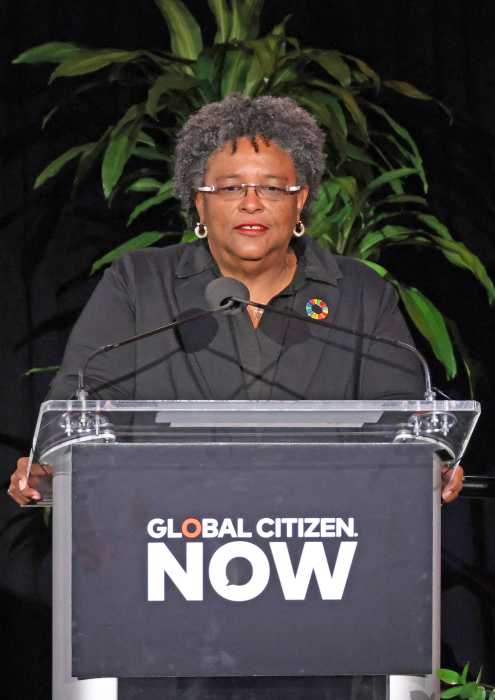Living in major cities with thriving pockets of communities maintaining their culture and heritage, diaspora may now be to general a term to adequately represent the modern day Caribbean transplant or descendant.
Chief curator and cultural entrepreneur at CaribBeing, Shelley Worrell, has coined the term “Caribpolitan” that has millenials latching on in expression of one of the many facets that comprise their identities.
“As sort’ve someone who was born here to Caribbean parents and travelling back and fourth between the U.S. and the Caribbean, I’ve always felt this gap like you didn’t have the full American identity or this full Caribbean identity. I felt it was very important to start to define what that could look like. It started off with my own personal introspection quest for knowledge,” she said.
“Caribpolitan” directly relates to those who identify as Caribbean — whether being a native to a country or descendant to Caribbean-born parents — living in metropolitan cities like Brooklyn’s Flatbush or London’s Brixton. According to CaribBeing’s website, a Caribpolitan is:
“CARIBPOLITAN /‘KAR-IB-POL-I-TAN/: [noun] 1. Term constructed from ‘Caribbean’ and the Greek root ‘polis’ which means city, citizenship or body of people. 2. 21st century person with West Indian origin / descent living in diasporic metropolitan communities such as Brooklyn’s Flatbush, Florida’s Miami, Toronto’s Brampton, and London’s Brixton. 3. Urban person with parentage from one or more Caribbean islands.”
Sparking conversations across social media, men and women of Caribbean descent are adding the term to their account bios. Despite the positive feedback, some feel that the term may be unnecessary and create a sense of privilege to those using the term. Blogger, Niama Sandy, wrote an essay about the new term on Mediu
“As with the term Afropolitan, there is danger in the exceptionalism implied. What of the people who have never lived outside of the Caribbean? Who have worked to raise the standard at home? Those who did leave but through whatever turn of events didn’t have access to funds, education or the other socio-economic trappings of what constitutes modern urbane enlightenment,” Sandy wrote.
Sandy’s initial distaste started with the term harboring an elitist vibe, separating Caribbean American’s in the states from those who might not have ever left their native countries or possibly don’t meet up to particular income levels. “I genuinely was rubbed the wrong way initially. Even with Afropolitan there’s this kind’ve attitude that people have when referring to the term that is exclusionary for perhaps people who don’t make a certain amount of money or haven’t left whatever country they originally were from. There’s definitely a way to be in the Caribbean or whatever part of Africa and still be cosmopolitan because I know tons of people who that applies to. It’s an elitist thing that struck me when I read it initally,” she said.
In response to Sandy’s critiques, Worrell affirms that Caribpolitan is not only a term that is meant to be inclusionary, it is also a term that provides another layer for Caribbean-American people to identify with. Much like one might describe themselves to be a New Yorker, singer, Jamaican and Caribpolitan.
“All of us have these very complex identities — there’s a part of you that can identify as being Caribpolitan and there’s another part that identifies being from New York, you can identify with your profession,” she said. “There are many, many things that make up our identities. I just see this as one of those things that people can identify with.”
Lawman Lynch, a recent transplant to Brooklyn from Jamaica, added, “I appreciate and identify with the term ‘Caribpolitan’ because I think it is progressive, it sounds inclusive and reminds me of ‘metropolitan.’ While the concept is similar to that of a “Diasporan” — living in the Diaspora, I think many individuals do not really identify with the word “Diaspora” and the term Diaspora is not unique to Caribbean people. Caribpolitan on the other hand is unique to Caribbean people and at the same time it doesn’t take away from the fact that we are Diasporans.”
Former Queens resident, Alexandra Siclait, feels the term allows for her as a Caribbean person to be connected to others from the Caribbean no matter what country they hail from. It also provides her the opportunity to connect her community in Haiti with her new community in Washington, D.C. “While I do not live in Brooklyn’s Flatbush, Florida’s Miami, Toronto’s Brampton or London’s Brixton, I am indeed a 21st century person with West Indian origin / descent, living in a diasporic metropolitan community who has parentage from one or more Caribbean Islands,” she said. “Identifying as a Caribpolitan reminds me of the nervous tension that links together my communities of origin and settlement.”
To launch Caribpolitan to the forefront, Worrell’s organization on June 5 began hosting a series of events entitled “CLOSE(R) ENCOUNTERS: The Caribpolitan Experience” featuring a film series highlighting contemporary Caribbean cinema and more. For more information about Caribpolitan or the upcoming event series, visit carib

























